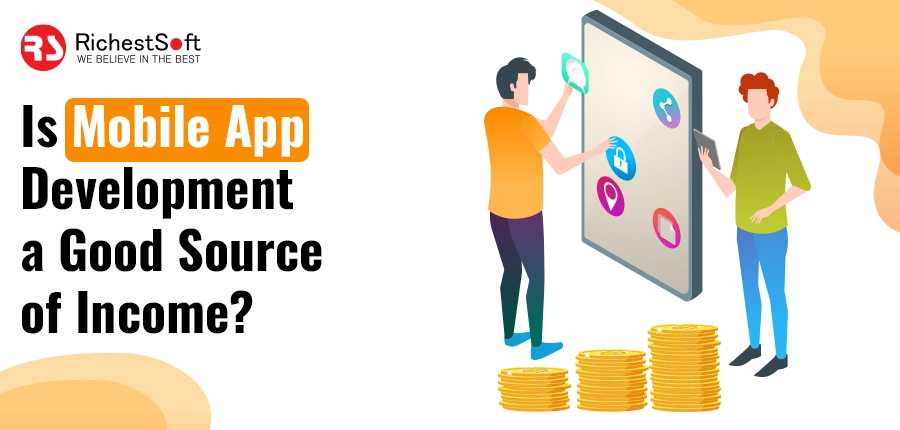In today’s digital generation, smartphones have become essential, empowering us with immediate access to information, communication, and entertainment. With this significant dependence on mobile devices, the demand for innovative and user-friendly mobile applications has skyrocketed. This surge has given an upward thrust to a fundamental question for aspiring developers and entrepreneurs: Is mobile app development a great source of earnings?
This blog will examine the numerous possibilities and attractive chances in mobile app development. We can delve into critical information, market trends, and success stories without considering why this sector has emerged as a viable and advantageous alternative for those looking for financial security and professional growth.
Statistics and Market Insights
Let us kick-start our investigation by examining some exciting statistics that illustrate the tremendous growth and profitability of the mobile app industry:
1. Revenue Growth: According to Statista, international mobile app revenue reached $935.2 billion by 2023, showcasing a significant growth from $365.2 billion in 2018.
2. App Downloads: In 2022 alone, consumers downloaded approximately 226 billion mobile apps worldwide, as reported by App Annie. This figure showcases the ever-growing demand for mobile applications across various sectors.
3. App Store Ecosystem: Distribution methods for mobile apps include Apple’s App Store and Google Play Store. These platforms work together to give developers access to over 5 million apps and build a robust monetization industry.
4. App Monetization: Multiple revenue streams are unrestricted to developers, including in-app purchases, subscription models, advertising, and sponsorships. This array of options authorizes developers to tailor their monetization method established on their target audience and the app’s niche.
In the upcoming blog of this post, we will delve more in-depth into the various factors of mobile app development, including the basic skills required, the app development lifecycle, marketing strategies, and monetization strategies. Stay tuned to unlock the secrets of success in this exciting and dynamic field.
Success Stories in Mobile App Development
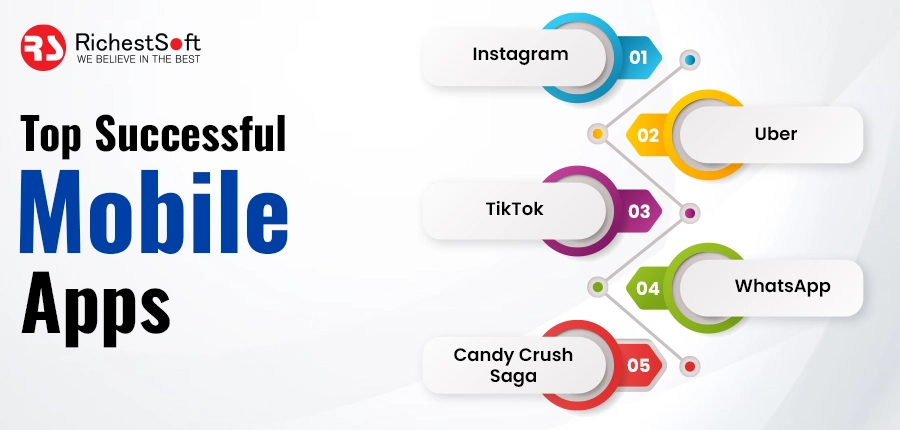
In the vast and ever-expanding world of mobile app development, success stories serve as a beacon of inspiration for aspiring app entrepreneurs. From small startups to multinational corporations, many individuals and teams have turned their innovative app ideas into remarkable achievements. In this post, we will explore a collection of success stories in mobile app development, highlighting the lessons learned and the key factors that contributed to their triumphs. Let us dive in and discover the inspiring journeys of these app entrepreneurs.
1. Instagram: Capturing the World with Visual Storytelling
Instagram began as a straightforward photo-sharing app when Kevin Systrom and Mike Krieger established it. It soon acquired popularity by giving users an easy-to-use and aesthetically pleasing platform to share their moments.
Instagram’s user-centered approach, user-friendly interface, and ongoing innovation are all factors in its success. Instagram increased due to its sassy feature expansion and adoption of popular trends like video content and stories, eventually leading to Facebook buying it for $1 billion.
Key Takeaway:
- Prioritize user experience.
- Adapt to changing trends.
- Continually innovate to stay ahead in the competitive app market.
2. Uber: Revolutionizing the Transportation Industry
Uber, co-founded by Travis Kalanick and Garrett Camp, disrupted the transportation industry with its revolutionary mobile app-based ride-hailing service. By leveraging real-time tracking, GPS technology, and seamless payment systems, Uber changed the way people travel. Uber’s success relies on its ability to identify a market pain point, provide a convenient solution, and create a dynamic ecosystem that benefits drivers and riders. Through relentless expansion and diversification into other services, such as Uber Eats, Uber became a global giant in the app economy.
Key Takeaway:
- Identify market gaps.
- Provide a seamless and convenient solution.
- Continually innovate and diversify to cater to evolving user needs.
3. TikTok: Empowering Content Creators Worldwide
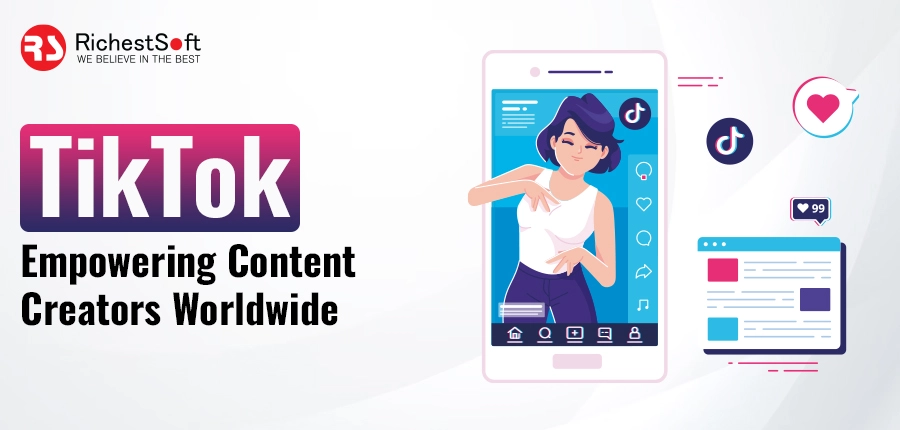
TikTok, created by the Chinese company ByteDance, took the world by storm with its short-form video content platform. TikTok quickly amassed a massive user base, primarily comprising young audiences by allowing users to create and share engaging videos. The app’s success can be attributed to its focus on user-generated content, algorithm-driven recommendations, and the ability to go viral. TikTok’s powerful content discovery and engagement mechanisms have propelled it to become one of the most downloaded apps globally.
Key Takeaway:
- Empower users to create and share content.
- Leverage algorithms for personalized recommendations.
- Foster a vibrant and engaged community.
4. WhatsApp: From Rags to Riches
WhatsApp, co-founded by Jan Koum and Brian Acton, began as a simple messaging app concentrating on user privacy and simplicity. By delivering a trustworthy and secure platform for instant messaging, WhatsApp quickly achieved popularity, eventually leading to its acquisition by Facebook for a staggering $19 billion. The app’s success can be credited to its user-centric technique, strong emphasis on privacy, and capability to provide seamless communication across different platforms and devices.
Key Takeaway:
- Focus on user needs
- Prioritize privacy and security
- Deliver a seamless and reliable user experience.
5. Candy Crush Saga: A Sweet Recipe for Success
Developed by King, Candy Crush Saga became a global sensation in mobile gaming. With its addictive gameplay, vibrant visuals, and social integration, the app attracted millions of players worldwide. Candy Crush Saga’s success lies in its ability to captivate users with engaging and challenging levels, encourage social competition, and leverage the freemium model, offering optional in-app purchases to enhance gameplay.
Key Takeaway:
- Create compelling and addictive gameplay.
- Foster social engagement.
- Consider the freemium monetization model.
How Can You Increase Your Earning with an App?
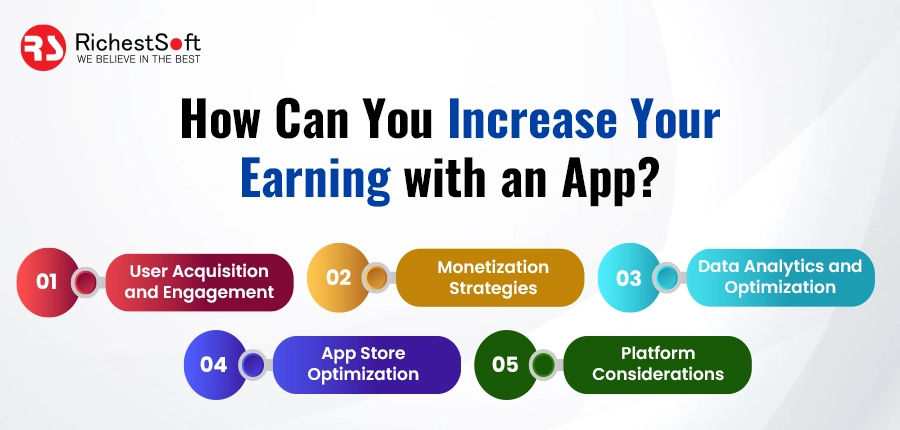
Mobile applications have become a gateway to endless possibilities for entrepreneurs and developers in the digital landscape. Apart from providing valuable services and engaging experiences to users, apps can also serve as a lucrative source of income. Imagine you are a mobile app owner or aspiring developer looking to increase your earnings. In that case, this post will show you beneficial strategies to maximize your mobile app’s revenue potential.
1. User Acquisition and Engagement
A. Build a solid user base: Attracting a significant number of users is crucial for increasing your app’s earning potential. Employ marketing strategies such as app store optimization, social media campaigns, and influencer partnerships to gain visibility and drive downloads.
B. Focus on user retention: Engaging and retaining users is equally important as acquiring them. Regularly update your app with new features, fix bugs, and promptly respond to user feedback. Providing a seamless and enjoyable experience increases the chances of retaining users and generating revenue through continued usage.
2. Monetization Strategies
A. In-App Purchases: Users can purchase additional features, premium content, or virtual goods within your app. Implement a freemium model where users can access basic functionality for free but pay for enhanced features.
B. Subscription Model: Provide a subscription-based offering with exclusive content or advanced functionality. Users pay a recurring fee for continued access to premium features, creating a stable and predictable revenue stream.
C. Advertisements: Integrate ads into your app by partnering with ad networks or displaying in-app ads. Options include interstitial ads, banner ads, and rewarded video ads. Ensure ads are unobtrusive and relevant to maintain a positive user experience.
D. Sponsorships and Partnerships: Collaborate with brands or businesses that align with your app’s niche or target audience: offer sponsored content, in-app promotions, or cross-promotion opportunities to increase revenue through mutually beneficial partnerships.
3. Data Analytics and Optimization
A. Track and analyze user behavior: Utilize analytics tools to gain insights into user interactions, preferences, and spending patterns. This data can help you optimize your app’s monetization strategy by identifying areas for improvement and personalizing user experiences.
B. A/B testing: Experiment with different monetization techniques, pricing models, and ad placements to identify what resonates best with your users. A/B testing allows you to make data-driven decisions and optimize revenue generation.
4. App Store Optimization (ASO)
A. Keyword Optimization: Conduct keyword research to identify relevant and high-ranking keywords that align with your app’s purpose. Optimize the title, description, and metadata to improve its discoverability in app store search results.
B. App Ratings and Reviews: Encourage users to leave positive ratings and reviews for your app. Higher ratings and positive reviews build credibility and trust, ultimately driving more downloads and increasing your app’s income potential.
5. Platform Considerations
A. Operating Systems: Develop your app for multiple platforms like iOS and Android to expand your user base and revenue opportunities. Consider each platform’s unique characteristics and guidelines to ensure optimal performance and user satisfaction.
B. Device Compatibility: Optimize your app seamlessly across various devices, screen sizes, and resolutions. Ensuring a smooth user experience on different devices increases user satisfaction and the likelihood of generating revenue.
Increasing your earnings with an app requires a comprehensive approach encompassing user acquisition, engagement, and effective monetization strategies. By attracting and retaining a loyal user base, implementing various monetization models, and continuously optimizing your app based on data-driven insights, you can unlock the full revenue potential of your app.
Remember, successful in-app monetization requires balancing generating revenue and providing a valuable user experience. Strive to create an app that delights users while offering them opportunities to support and engage further through premium features or advertisements. With the right strategies and continuous refinement, you can enhance your earning potential and build a sustainable app business in today’s competitive digital landscape.
Steps to Establish a Successful Mobile App Business
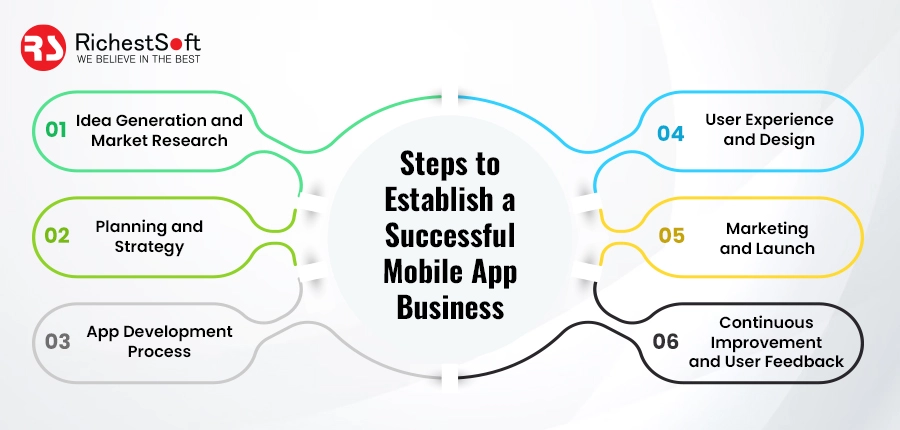
In the fast-paced digital generation, mobile apps have become a powerful avenue for entrepreneurs and app developers to launch successful businesses. This post is your guide if you have a great mobile app idea and desire to turn it into a successful venture. We will walk you through the crucial steps to launch a successful mobile app business, providing you with the opportunity to navigate the app development landscape confidently and clearly.
1. Idea Generation and Market Research
A. Identify a Problem to Solve: Identify a problem or need within a specific market or niche. Perform thorough market research to comprehend your target audience, competitors, and industry trends. This research will help shape your app idea and ensure its viability in the market.
B. Validate Your Idea: Gather feedback from potential users or industry experts to validate your app concept. Conduct surveys, interviews, or prototype testing to gain insights and refine your idea based on real-world feedback.
2. Planning and Strategy
A. Define Your Value Proposition: Clearly articulate the unique value your app brings to users. To make your mobile app stand out from the competition, it is essential to determine its outstanding features and functions. It will give users an apparent reason to select your mobile app over others.
B. Set Clear Goals and Objectives: Establish specific, measurable, achievable, appropriate, and time-bound (SMART) objectives for your mobile app business. Define metrics for success, such as the number of downloads, active users, revenue targets, or user engagement levels.
3. App Development Process
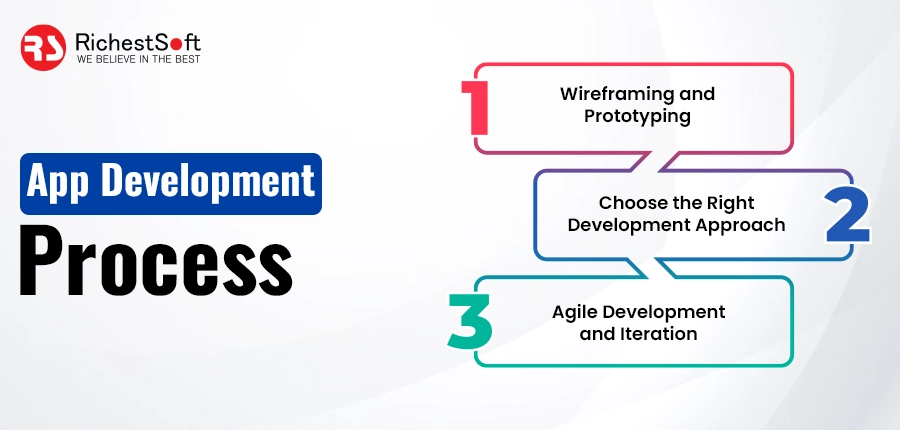
A. Wireframing and Prototyping: Use wireframing tools to visualize your app’s interface and user flow. Develop interactive prototypes to test the user experience and iterate on design and functionality.
B. Choose the Right Development Approach: Decide whether you will develop the app in-house or outsource the development to a professional app development agency. Consider factors such as budget, timeline, technical expertise, and scalability.
C. Agile Development and Iteration: Adopt an agile development methodology, breaking down the app development process into smaller iterations or sprints. Continuously gather user feedback, iterate on features, and make improvements throughout the app development cycle.
4. User Experience and Design
A. Intuitive User Interface: Design a user-friendly design that appeals to the eye and matches the preferences and actions of your target audience. Emphasize clarity in vital information conveyance, ease of navigation, and simplicity.
B. Seamless User Experience: Improve your app’s responsiveness, performance, and loading times. Do usability testing to guarantee a seamless and engaging user experience across various devices and operating systems.
5. Marketing and Launch
A. App Store Optimization (ASO): Optimize your app’s visibility in app stores by strategically using relevant keywords, writing compelling descriptions, and utilizing high-quality app icons and screenshots. ASO is crucial for attracting organic traffic and increasing downloads.
B. Pre-launch Marketing: Generate buzz and anticipation for your app by leveraging social media, creating a landing page, or running a pre-launch campaign. Build an email list of interested users to notify them once your app is available.
C. Post-launch Marketing: Develop a comprehensive marketing strategy to promote your app. Utilize social media, content marketing, influencer partnerships, app review sites, and targeted advertising to reach your target audience and increase app downloads.
6. Continuous Improvement and User Feedback
A. Gather User Feedback: Encourage users to provide feedback through app ratings, reviews, or in-app surveys. Listen to user suggestions and concerns to improve your app and meet user expectations regularly.
B. Regular Updates and Feature Enhancements: Release updates often to resolve bugs, enhance performance, and add new features in response to customer input and market trends. Updating your app improves user engagement and happiness.
How Can RichestSoft Help You With Mobile App Development?
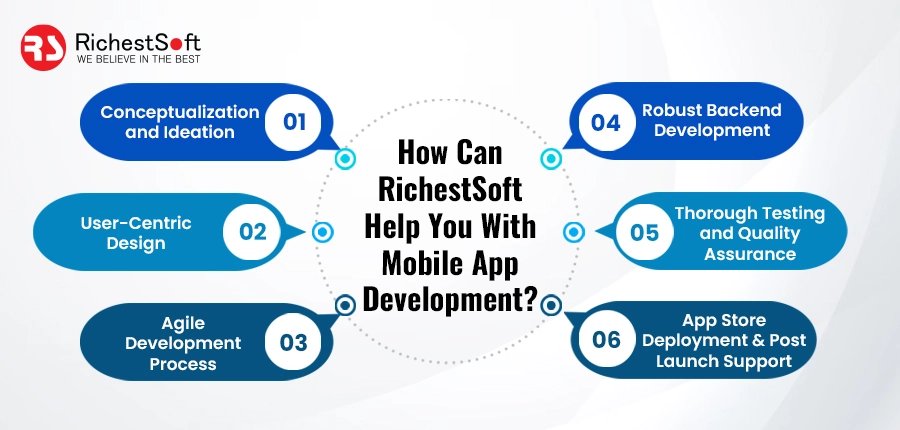
RichestSoft is a trusted mobile app development leader. They can assist you in bringing your mobile app concept to life with creativity, technical prowess, and strategic planning. Get the help required to build a successful and impactful mobile app.
1. Conceptualization and Ideation
At RichestSoft, we understand that a solid foundation is major to building a successful mobile app. Our skilled professionals work closely with you to comprehend your goals, target audience, and preferred mobile app functionalities. Through joint brainstorming sessions, we enable you to refine your mobile app concept, pinpoint unique selling points, and develop a complete strategy that aligns with your business objectives.
2. User-Centric Design
A visually appealing and intuitive user interface is crucial for engaging app users. RichestSoft’s talented designers leverage their expertise to create stunning app designs that captivate users and provide a seamless and delightful user experience. From wireframing to prototyping, our design team ensures your app looks great and functions intuitively across various devices and platforms.
3. Agile Development Process
At RichestSoft, we follow an agile development methodology that prioritizes flexibility, collaboration, and iterative improvements. Our trustworthy development team is experienced in different technologies and frameworks, providing your mobile app is built using the most appropriate tools for your precise necessities. We keep you engaged throughout the development cycle, providing regular updates, seeking feedback, and making adjustments to deliver a high-quality mobile app within the agreed-upon timeframe.
4. Robust Backend Development
A robust and scalable backend is the backbone of a successful mobile app. RichestSoft’s skilled developers have expertise in building secure and efficient server-side architectures, APIs, and databases that seamlessly integrate with the app’s front end. Our focus on performance optimization and data security ensures your app can easily handle user interactions, data storage, and future growth.
5. Thorough Testing and Quality Assurance
To ensure a flawless user experience, RichestSoft emphasizes rigorous testing and quality assurance processes. Our experienced QA engineers perform comprehensive testing across various devices, screen sizes, and operating systems to identify and rectify any issues before launching your app. This meticulous attention to detail helps deliver a polished, bug-free app that meets the highest quality standards.
6. App Store Deployment and Post-Launch Support
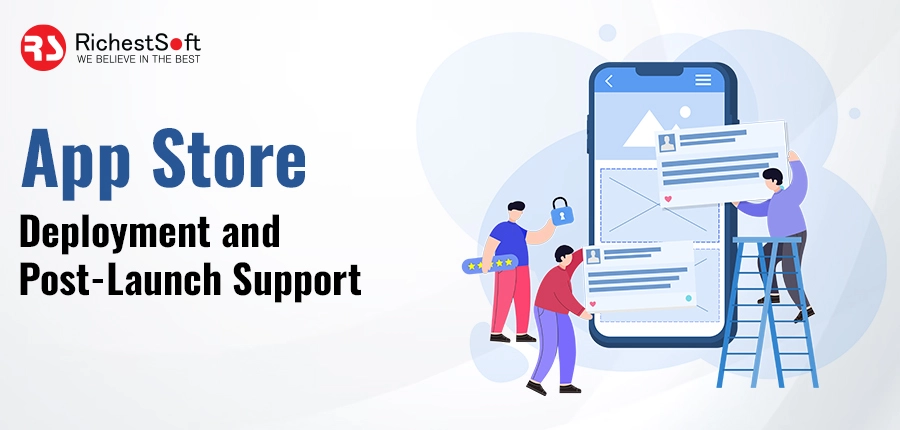
Once your app is ready, RichestSoft assists you in navigating the complexities of app store deployment. We help you with the submission process, optimizing your app’s visibility, and adhering to platform-specific guidelines. Furthermore, our support continues after the app launch. We offer post-launch support, monitoring app performance, gathering user feedback, and providing ongoing updates and enhancements to ensure your app remains competitive and evolves with changing market needs.
FAQs
Q1: Is mobile app development a profitable venture?
Ans: Yes, mobile app development can be a highly profitable venture. As smartphones dominate the digital landscape, businesses and people constantly search for progressive apps to satisfy their requirements. Suppose you expand a high-quality app that solves a particular problem or offers a unique value proposition. If so, you have got the potential to generate substantial revenue through numerous monetization techniques, consisting of in-app purchases, subscriptions, advertisements, or app income.
Q2: How do I identify a profitable app idea?
Ans: Identifying a profitable app idea requires thorough market research and an understanding of user needs. Look for gaps in the market where existing apps must provide a satisfactory solution. Conduct surveys, analyze competitor apps, and seek feedback from potential users to validate your app concept. Additionally, consider targeting niche markets or industries with specific demands currently underserved by existing apps.
Q3: Do I need technical expertise to develop a mobile app?
Ans: While technical expertise certainly helps, you can be something other than a coding expert to develop a mobile app. Several options are to be had for aspiring app entrepreneurs, which include hiring a development team, partnering with a technical co-founder, or utilizing low-code/No-code app development platforms. These platforms deliver user-friendly drag-and-drop interfaces, authorizing even those with limited coding proficiency to build mobile apps. It makes app development more unrestricted to beginners.
Q4: How can I monetize my mobile app?
Ans: There are multiple ways to make money from your mobile app. The most popular modes are:
- In-app purchases: Offering a fee for additional features, virtual goods, or premium content.
- Subscriptions: Providing users access to exclusive content or enhanced functionality through recurring payments.
- Advertising: Displaying ads within the app and earning revenue based on impressions, clicks, or conversions.
- App sales: Charging a one-time fee for users to download and access your app.
The choice of monetization strategy depends on factors such as your target audience, app category, and the value proposition your app offers.
Q5: What are the challenges in mobile app monetization?
Ans: Mobile app monetization can come with its challenges. Some common hurdles include the following:
- Market saturation: The app market is highly competitive, and standing out from the crowd can be challenging. Developing a unique and valuable app that captures users’ attention is crucial.
- User retention: Retaining app users can be difficult, as user expectations are high, and there is a constant influx of new apps. Ensuring a seamless user experience, providing regular updates, and actively engaging with your user base can help address this challenge.
- Monetization strategy selection: Choosing the right monetization strategy for your app requires careful consideration. It is crucial to balance generating revenue and maintaining a positive user experience to avoid alienating users.
Conclusion
Mobile app development holds significant capability as a rewarding source of earnings. With the exponential boom of smartphone usage and the growing reliance on mobile apps, the demand for revolutionary and user-friendly applications continues to rise. It allows people and companies to tap into the app market and generate massive revenue.
However, it is critical to understand that success in mobile app development requires thorough studies, strong user needs information, and powerful monetization strategies. At the same time, as demanding situations may arise, with dedication, creativity, and a focus on delivering value to users, mobile app improvement can be profitable and worthwhile.
So, when you have an excellent app concept, do not hesitate to explore the earnings potential that mobile app development offers.
 +1 315 210 4488
+1 315 210 4488 +91 798 618 8377
+91 798 618 8377